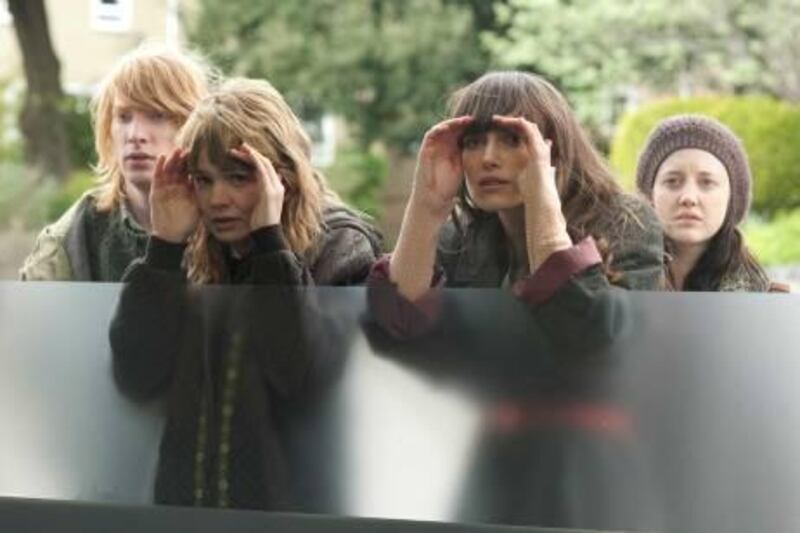Eat Pray Love - the film adaptation of Elizabeth Gilbert's hugely popular memoir, which chronicles the author's journey of enlightenment around the world after a divorce - was something of a no-brainer: with more than five million people buying a copy of the book, enticing just a fraction of them into the cinema was a sure-fire route to box-office success. Which is why book adaptations are increasingly popular in Hollywood: with money tight, studios prefer the safety net of a ready-made audience. It has ever been thus. Back in 1939, Gone With the Wind was an eagerly awaited adaptation of Margaret Mitchell's southern epic. But even the most cursory of glances at the forthcoming films to hit our screens in the next year suggests the balance has tipped firmly away from the original screenplay.
Not least because literary adaptations are often Oscar bait, too, as Push: A Novel (renamed Precious), Walter Kirn's Up in t he Air and Lynn Barber's An Education all proved last year. So the film version of Kazuo Ishiguro's 2005 novel Never Let Me Go will surely fit firmly into that category when the 2011 nominations are made. At the Toronto Film Festival this month it was widely praised for the way Mark Romanek's direction subtly deals with its premise - that scientists discovered how to prolong human life in the 1950s - without losing sight of the love story and moral quandary at its heart.
Never Let Me Go, which will be screened here as part of the Abu Dhabi Film Festival, has enjoyed a relatively smooth transition to the screen - Alex Garland adapted Ishiguro's novel before it had even been published. Sometimes, though, the sheer density of the source material causes huge problems. Barney's Version was written by the Canadian author Mordecai Richler in 1997, but has been in development ever since - going through five writers and the death of Richler himself. The producer Robert Lantos even admitted at the Toronto Film Festival that during the completed film's 13-year gestation, two of the previous writers had been Oscar-winners. Even they couldn't get to the heart of the story.
"The book is extremely difficult to adapt," Lantos said. "It's sprawling in nature, [has] a huge cast of characters, with flashbacks and flash-forwards, and it's narrated by this character who has been diagnosed with Alzheimer's. It's so good, so rich and juicy, that the instinct is to preserve it all, but you can't do that in two hours onscreen." By comparison, the producers of the bucolic drama Tamara Drewe had it easy. Even so, the Oscar-winning director Stephen Frears had a lot of history to contend with. Based on a much-loved weekly comic strip in an English newspaper by Posy Simmons, itself loosely inspired by Thomas Hardy's novel Far From the Madding Crowd, Frears's attitude was to use all these sources as the background for his film rather than adapt the actual story too closely.
Does it work? Mostly. Certainly, directors and screenwriters make life easier for themselves if they loosely base their films on existing texts rather than attempting full-scale adaptations, which inevitably attract criticism from rabid fans of the books. The two films at the top of the US box-office right now do suggest that merely using books as a starting point is often more successful. The Town, Ben Affleck's bank robber caper, is based on a Chuck Hogan book, Prince of Thieves. And Easy A, a high-school comedy about abstinence enjoying surprisingly good reviews, is loosely tied to Nathaniel Hawthorne's classic novel The Scarlet Letter.
The "inspired-by" route is also one that Rowan Joffe has taken for his version of Brighton Rock, out later this year. Unsurprisingly, really, as Graham Greene's original murder-thriller remains a classic of 20th-century English writing, and the 1947 film is considered to be one of the best British films of all time. Joffe, though, has moved matters 30 years forward, into the era of The Beatles. This is less a remake and more a new look at a much-loved story.
It's not just the English-speaking film industry that finds increasing inspiration in books. Two of the most eagerly awaited foreign language films of this year are the horror-romance The Solitude of Prime Numbers by the best-selling Italian writer Paolo Giordano, and Norwegian Wood by the peerless Japanese writer Haruki Murakami. And even the theatre is catching the bug. The best adaptation of Phillip Pullman's His Dark Materials trilogy wasn't the film at all, but a magnificently intense 2003 theatrical version performed in two parts. Sebastian Faulks' Birdsong, the First World War epic, has just opened in London, directed by Sir Trevor Nunn. The poet laureate Carol Ann Duffy will also see her poetry adapted for a magical Christmas show, Beasts and Beauties.
So the journey from page to stage or screen might be oft-travelled, and the rewards great for those who pull it off in style. But for every credible adaptation such as The Road (Cormac McCarthy) or A Single Man (Christopher Isherwood), there's the story of Yann Martel's Booker Prize-winning Life of Pi. All sorts of big-name directors have been linked with the task of chronicling in film the story of a shipwrecked teenaged boy marooned on a life raft - Jean-Pierre Jeunet, Alfonso Cuaron and M Night Shyamalan to name just three. Last year Ang Lee picked up the baton, but even he told the Digital Spy website: "How exactly I'm going to do it, I don't know. A little boy adrift at sea with a tiger. It's a hard one to crack!"
Since then... nothing but a sketchy, projected 2012 release date. Sometimes, it seems, books are best left on the bookshelves.





